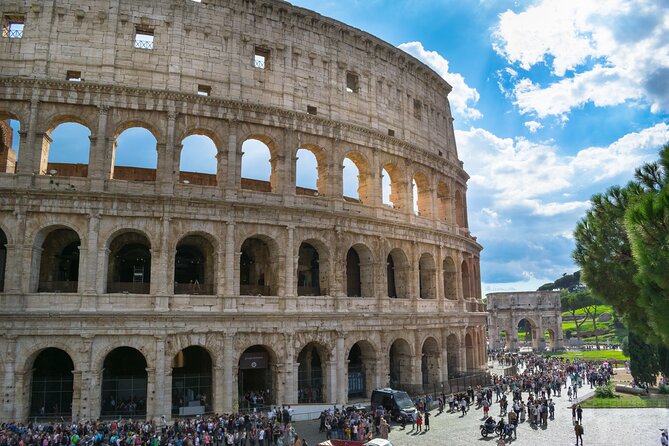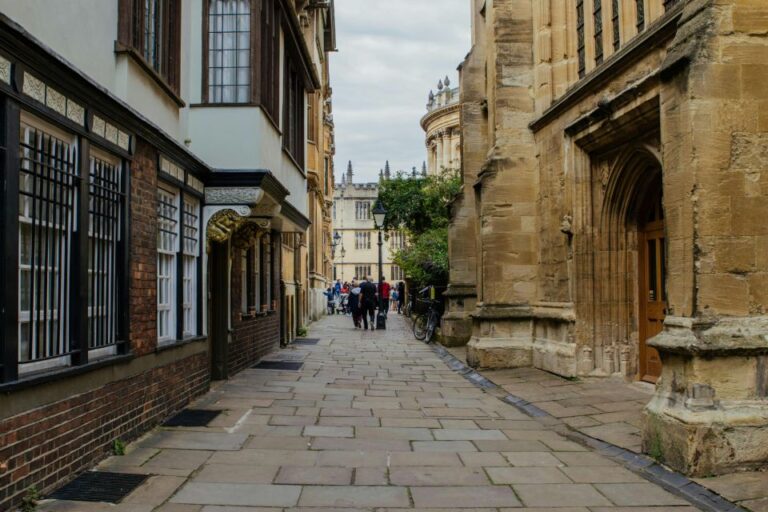Ephesus, the once-thriving ancient Greek city, stands as a testament to the grandeur of the past. Visitors can embark on a full-day tour from Kusadasi or Izmir, seeing the well-preserved ruins that offer a glimpse into the city’s remarkable history. From the iconic Library of Celsus to the captivating Terrace Houses, the tour promises to captivate and educate, leaving travelers with a deeper understanding of Ephesus’ significance in the spread of early Christianity. Whether you’re a history buff or simply seeking an enriching cultural experience, this comprehensive tour is sure to leave a lasting impression.
Key Points
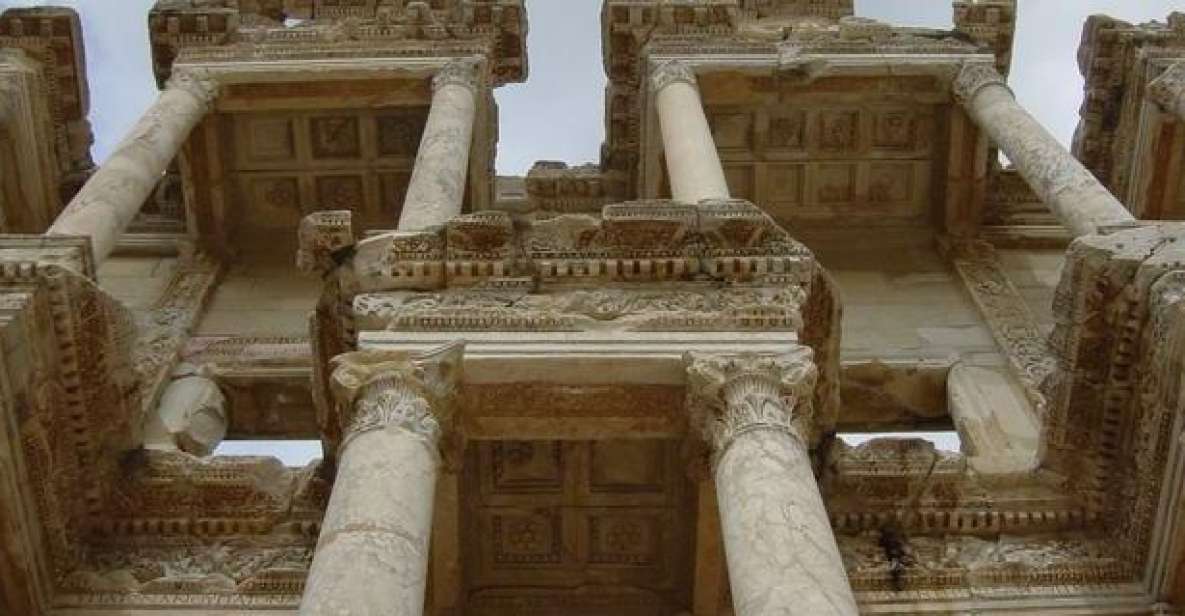
- Explore the captivating grandeur of the well-preserved ancient city ruins of Ephesus, including the iconic Library of Celsus and the imposing 24,000-seat theater.
- Visit the Terrace Houses on Bulbul Mountain to gain an intimate understanding of the social hierarchy and domestic life of Ephesus’ elite class.
- Discover the House of the Virgin Mary, a destination for pilgrims seeking to commemorate Mary’s life, and the Basilica of St. John, which offers a profound connection to early Christianity.
- Admire the architectural prowess and reverence for imperial power showcased in the Temples of Hadrian and Domitian.
- Set out on a full-day tour from Kusadasi or Izmir to learn about the rich history and cultural heritage of the ancient city of Ephesus.
Exploring the Ephesus Ruins
Visitors to the Ephesus ruins can’t help but be captivated by the grandeur of this once-thriving ancient city, as they weave through the remarkably well-preserved ruins that bear witness to its storied past.
The iconic Library of Celsus, with its ornate facade, stands as a testament to the city’s intellectual prowess.
Nearby, the imposing Temple of Hadrian and the magnificent 24,000-seat theater serve as reminders of Ephesus’ cultural and political significance.
Wandering through the Terrace Houses on Bulbul Mountain, visitors can glimpse the opulent lifestyles of the city’s elite.
From the Fountains of Trajan to the Basilica of St. John, every corner of the Ephesus ruins offers a window into the vibrant history of this remarkable archaeological treasure.
The Library of Celsus
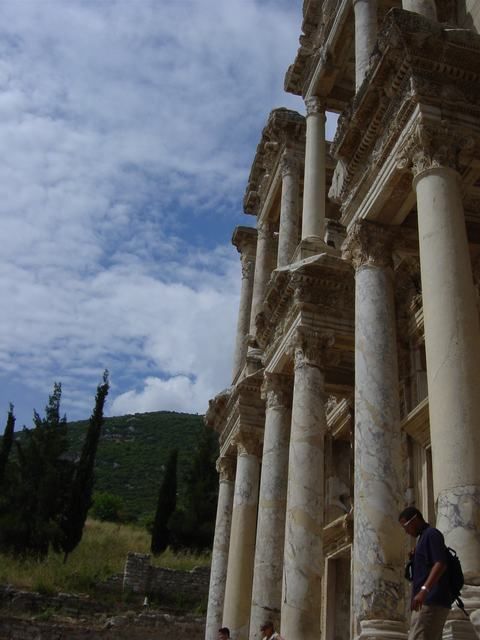
The Library of Celsus stands as one of Ephesus’ most iconic and well-preserved monuments, boasting an ornate and impressive facade that captivates all who witness it.
Built in the 2nd century AD, this magnificent structure was commissioned to honor Tiberius Julius Celsus Polemaeanus, a Roman consul.
Adorned with columns, statues, and intricate carvings, the library’s grand entrance is a true testament to the architectural prowess of the ancient world.
Visitors can explore the interior, which once housed over 12,000 scrolls, and marvel at the stunning detail that has withstood the test of time.
The Library of Celsus is undoubtedly a highlight of any tour through the ruins of this ancient city.
Temples of Hadrian and Domitian
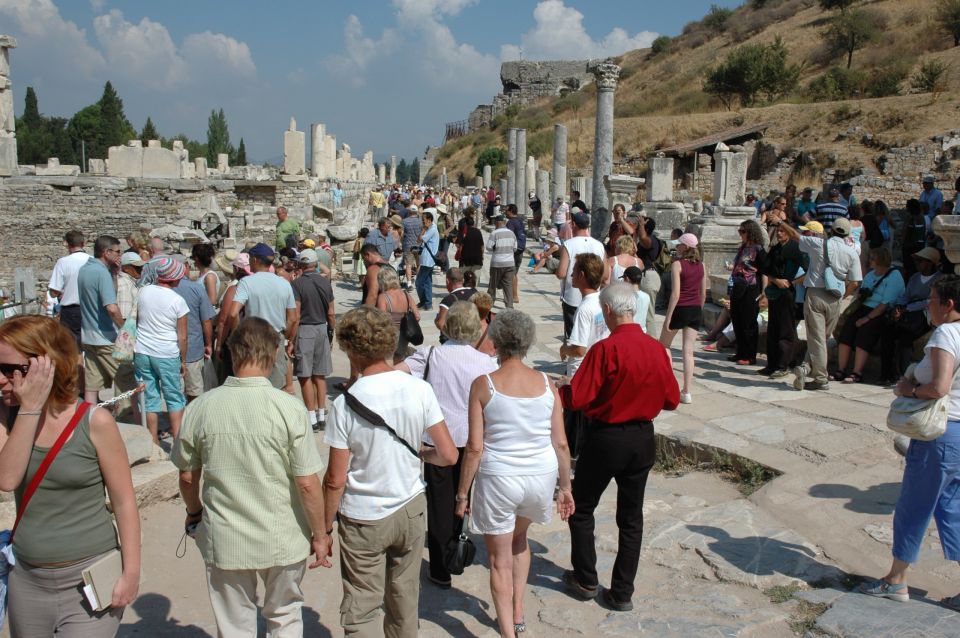
Amidst the captivating ruins of Ephesus, two temples stand as testaments to the enduring influence of Roman emperors – the Temples of Hadrian and Domitian.
The Temple of Hadrian, dating back to the 2nd century AD, is renowned for its intricate façade adorned with carvings and statues. This magnificent structure honors the Emperor Hadrian, who visited Ephesus during his reign.
Nearby, the Temple of Domitian pays homage to the Emperor Domitian, who ruled in the late 1st century AD.
Both temples showcase the architectural prowess and reverence for imperial power that characterized ancient Ephesus. As visitors explore these structures, they gain insight into the city’s rich history and the veneration of Roman leadership.
Terrace Houses on Bulbul Mountain
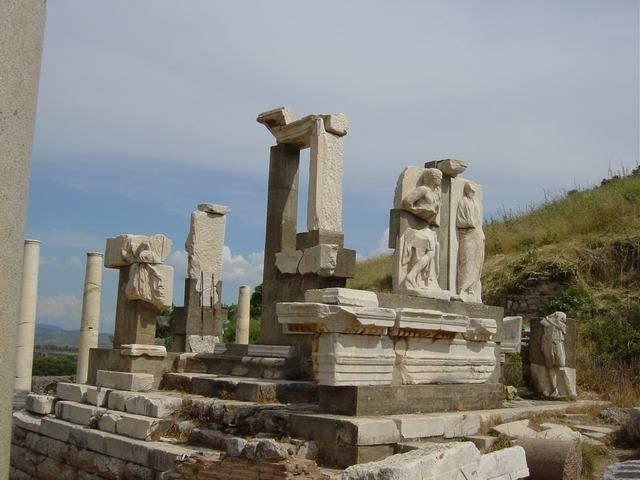
Ascending the slopes of Bulbul Mountain, visitors find themselves immersed in the remarkably well-preserved Terrace Houses, once the exclusive domain of Ephesus’ elite. These multilevel homes, nestled into the hillside, offer a unique glimpse into the daily lives and luxuries of the city’s upper class. Elaborately decorated with mosaics and frescoes, the Terrace Houses showcase the architectural prowess and artistic sensibilities of their former inhabitants.
| Feature | Description |
|---|---|
| Layout | Multi-story, interconnected dwellings |
| Decoration | Exquisite mosaics and wall paintings |
| Amenities | Underfloor heating, running water, and latrines |
Exploring the Terrace Houses provides a captivating contrast to the grand public structures of Ephesus, offering a more intimate understanding of the city’s social hierarchy and domestic life.
House of the Virgin Mary
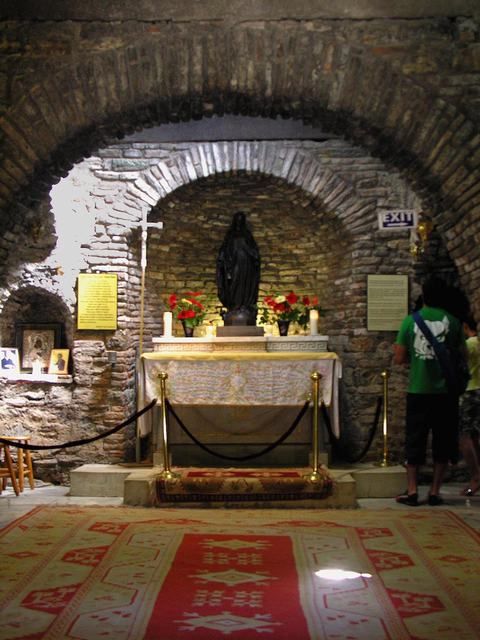
Perched atop a mountainside near Ephesus, the House of the Virgin Mary draws pilgrims from around the world who seek to commemorate the final years of Mary’s life.
This humble stone structure is believed to be the last home of the mother of Jesus, where she lived out her final days. Visitors can walk through the small chapel and see the altar, as well as the spring where Mary is said to have drawn water.
The site also features a statue of the Virgin Mary and offers stunning views of the surrounding countryside. For those interested in religious history and the life of one of Christianity’s most revered figures, the House of the Virgin Mary is a must-see destination on the Ephesus tour.
Basilica of St. John
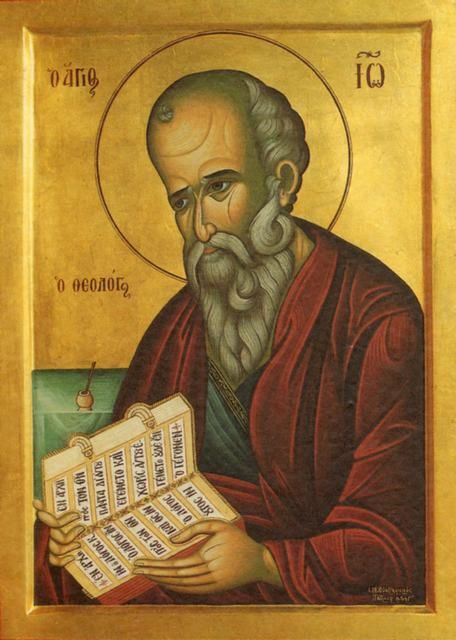
The Basilica of St. John stands as a testament to the enduring legacy of one of Christianity’s most revered figures. Constructed in the 6th century AD, this impressive ecclesiastical structure was built atop the believed burial site of the Apostle John, who’s said to have written his gospel and three epistles while living in the city of Ephesus.
Visitors to the site can explore the grand ruins, which once housed a magnificent domed basilica and numerous chapels. The Basilica of St. John offers a profound connection to the early days of Christianity, inviting pilgrims and history enthusiasts alike to reflect on the deep spiritual significance of this hallowed ground.
The tour of the Basilica of St. John provides an opportunity to:
- Contemplate the enduring influence of the Apostle John’s teachings.
- Appreciate the architectural grandeur of a bygone era.
- Understand the pivotal role of Ephesus in the spread of Christianity.
- Connect with the rich tapestry of history that has unfolded within these walls.
Tour Inclusions and Exclusions
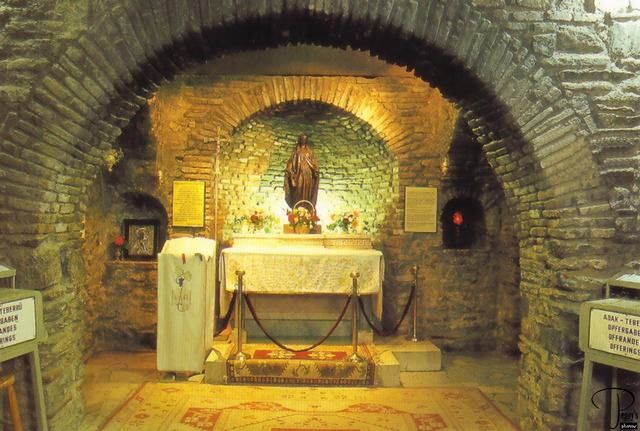
What does the full-day guided tour from Kusadasi or Izmir to Ephesus include? The tour includes a professional guide in the preferred language, an air-conditioned vehicle with a driver, pickup and drop-off service, and entrance fees to the museums and sites. However, the tour excludes items of a personal nature, any items not specifically mentioned as included, and gratuities for the guide and driver.
| Tour Inclusions | Tour Exclusions |
|---|---|
| Professional guide | Items of a personal nature |
| Air-conditioned vehicle | Anything not specifically mentioned |
| Pickup and drop-off | Gratuities for guide and driver |
| Entrance fees |
The tour is not suitable for people with mobility impairments or wheelchair users, so comfortable walking shoes are recommended.
Preparing for the Tour
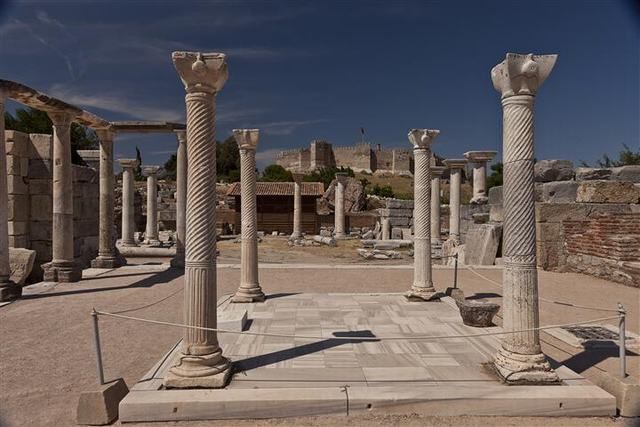
To prepare for the tour, visitors should wear comfortable walking shoes and bring a sun hat, sunglaces, and sunscreen. The ancient ruins of Ephesus involve extensive walking, so proper footwear and sun protection are essential for a pleasant experience.
Plus, it’s a good idea to:
- Bring a water bottle to stay hydrated
- Wear breathable, lightweight clothing
- Carry any needed medications
- Pack a small backpack or bag for personal items
Following these simple tips will help ensure a smooth and enjoyable exploration of the incredible Ephesus ruins. With the right preparation, visitors can make the most of this incredible opportunity to step back in time and enjoy the history and grandeur of this ancient city.
Frequently Asked Questions
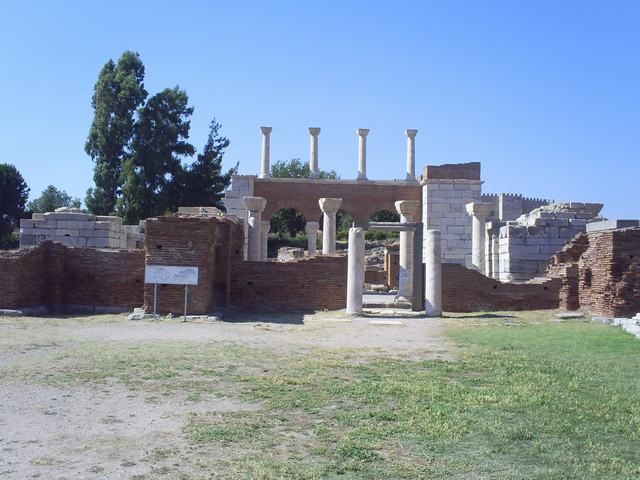
Is the Tour Guide Fluent in My Native Language?
The tour guide is fluent in the visitor’s preferred language. The tour operator provides professional guides who can communicate effectively with participants in their native language throughout the full-day guided excursion.
Can I Take a Break During the Tour if Needed?
Participants can take breaks during the tour if needed. The tour guide is flexible and accommodating, allowing visitors to rest or attend to personal needs throughout the day as required.
What Is the Cancellation Policy for This Tour?
The cancellation policy allows for full refunds with 24 hours’ notice. Guests can cancel or modify their booking at any time prior to the tour date, subject to the 24-hour requirement. No-shows or late cancellations may incur penalties.
Can I Bring Small Children on This Tour?
Bringing small children on this tour is generally not recommended. The tour involves extensive walking and visiting ancient ruins that may not be suitable or safe for young children. It’s best to consider alternative family-friendly activities.
Is There an Option to Customize the Tour Itinerary?
The tour itinerary can generally be customized to meet the needs and interests of the group. Travelers can discuss options with the tour operator to focus on specific sites or areas of interest within the Ephesus ruins.
Recap
The Ephesus tour offers a comprehensive exploration of the ancient city’s well-preserved ruins, providing visitors with an immersive experience into its rich cultural and historical legacy.
From the iconic Library of Celsus to the Basilica of St. John, the tour showcases the grandeur and significance of Ephesus, making it a must-visit destination for anyone interested in the ancient Greek and early Christian history of the region.

